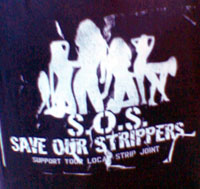|
|
Dance bars around Nepal attract all kinds of attention. Customers, salacious or bored, looking for a drink and a show. Cops on the take. Women's rights and labour activists. The moral outrage brigade.
Now these diverse groups are coming together to counter the Maoist-affiliated All Nepal Women's Organisation - Revolutionary (ANWO-R). In late July the organisation started a "preliminary investigation" into the dance bar, dohori, and cabin restaurant business. The Maoist women seem to have sent the message: "clean up the dance bars, or we will." When contacted, ANWO-R downplayed the issue, saying it was a small part of its larger political awareness program.
But the dance bar owners and the police are not taking the 'investigation' lightly, and neither are labour unions and NGOs, who believe that dance and dohori restaurants come under the purview of 'civil society'. It's almost a turf war, and who calls the shots is significant.
Three weeks ago, faced with the ANWO-R investigation, the police sent a letter to owners directing them to stop nude dancing, among other things, or face closure. In response, about 50 dance bar owners got together to figure out how to save their businesses, and formed the Nepal Dance Bar Entrepreneurs' Association.
They consulted the Nepali Congress (D)-affiliated Democratic Confederation of Nepalese Trade Unions (DECONTU), the Nepal Police, and members of various civil society groups, and came up with a code of conduct. While this motley crew of previously opposed groups wrote the code jointly, it is to be "self-imposed", says Sameer Gurung, president of the owners' association.
Though the business has grown enormously in the last dozen or so years, it is all illegal. Bars, even regular ones, may not legally stay open after 10PM. The Hotel Management Sale and Distribution of Alcohol Control Act 2023 also prohibits what it calls "obscene and vulgar dances". Dance bars started up in Kathmandu in the mid-90s and were tolerated in large part because gentrified versions already existed in the city's casinos.
The Nepal Police has for years played a cat and mouse game with dance bars owners and dancers, arresting them and letting them go after payment of a fine. Often, the proliferation of dance bars, and what goes on inside them is explained with the argument that many members of the police force have a financial interest in the business.
Owners, police, labour unions, and dancers we spoke to all said the only way to improve conditions is to legalise the business. DSP Pradhumna Karki, who prepared a report on dance bars after ANWO-R's investigation began, says the only license any restaurant or bar needs is that permitting the sale of alcohol. And even that, he says frustrated, is a bureaucratic trap: "They have to register in four places and we are supposed to 'follow up'. It's just not possible for us to stop it, but if we legalise the business, we can monitor the excesses."
|
|
| A dance bar customer wears his feelings on his T-shirt. |
At a recent meeting, the owners' group agreed in the short term to stop the nude dances. As of last weekend, not everyone had put this into practice. In the long term, they agreed to try and "make the business more respectable and organised, and bring it under legal jurisdiction." They say their business is real economic activity, and a good potential source of revenue for the government.
Owners, dancers, women and labour rights groups, and police we spoke to all buy the law enforcement and economic arguments, but the stigma attached to working in-and owning-a dance bar is harder to eradicate. Even as owners say they're willing to clean up their act if a law comes into effect, nearly everyone we spoke to requested anonymity. A straw poll of some women who do dance suggests that for them, the financial gains outweigh the 'shame'. Many argued for legalisation to reduce sexual harassment, improve working conditions, and slowly strip away the taboo.
The Maoist women are playing up the decency angle, as a morally superior authority. In fact, the ANWO-R's 'political awareness' plan and investigation are part of a larger Maoist push to occupy increasingly visible and authoritative positions among unions and other professional organisations. Recent microbus strikes and troubles at The Everest Hotel are the work of Maoists in trade unions.
If the drive to legalise dance bars picks up steam there will be public debate, and women's rights lawyer Sapana Pradhan Malla says the terms need to be expanded if the new laws are to legislate reality on the ground, rather than enforce morality. "It's easy for radical groups to target dance bars," she says, "but not all who work there are sex workers, and compared to other underprivileged women they make good money." Malla says we need to examine our social values, if anything, because "It [dance bar work] is a question of voluntary choice, though as long as there is demand there will be supply."
Comment at Nepali Times Blog




